International Day of Women and Girls in Science: Sustainability Spotlight
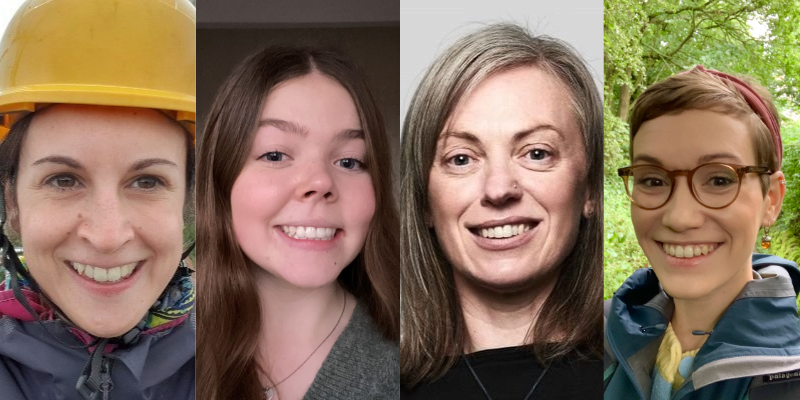
This past Sunday 11 February saw the International Day of Women and Girls in Science (IDWGIS).
As we’re spotlighting campus biodiversity this month, we’re celebrating our female environmental scientist staff, students, and alumni!
Hannah Long, Hazel Mooney, Claire Quinn and Cat Scott share their inspiring journeys navigating environmental science at the University of Leeds...
Hannah Long – Biology Student and Student Sustainability Architect

Hannah is a currently studying biology at the University of Leeds and is a Student Sustainability Architect. Interested in conservation biology and ecology, we asked Hannah what inspired her to get into this area of work:
Throughout my childhood and into early adulthood I have always had a passion for animals and nature, I enjoy spending time outdoors and observing animals in their natural habitat. This led me to study Biology at university, showing particular interest in both ecology and zoology. I then took a year abroad to study a nature conservation programme in Sweden. Here I learned more about conservation biology and biodiversity by undertaking various projects, such as designing a nature reserve and enhancing biodiversity on an agriculture site. These projects were mainly theoretical, with no physical implications made and left me inspired to take my knowledge and apply it to a real-life situation.
Why is conservation and biodiversity work important?
Unfortunately, the ever-growing population means that areas are becoming more built up and habitats are often lost. This drastically effects the local wildlife, creating a decrease in biodiversity. The constant build-up of rural areas means habitats become smaller in size and fragmented, reducing the connectivity of many species’ habitats across cities. This provides difficulty for wide-ranging species making them more vulnerable to disease and at greater risk of extinction. The university being an urban area needs to ensure biodiversity is still managed and hopefully work to create a network for biodiversity into the city.
What is your advice for women and girls wanting to get involved in conservation work?
Get as much experience as you can in the sector, there are loads of volunteering or involvement sessions out there, particularly at the university which are open to staff, students and the public. Attending sessions allows you to meet like-minded people and gain additional knowledge about conservation and biodiversity, giving you a talking point in job applications and interviews. Additionally, if you have the time, reach out to ecology companies, these need help with monitoring over the summer and will often pay you for your time.
In an effort to enhance biodiversity on campus and get more people connected with nature, Hannah will be leading a Campus Biodiversity Monitoring Session on Thursday 15 February. This is open to all, and involves walking along the campus transects and observing biodiversity to later record on the iNaturalist program!
Hazel Mooney - PhD researcher in the Institute of Climate and Atmospheric Sciences
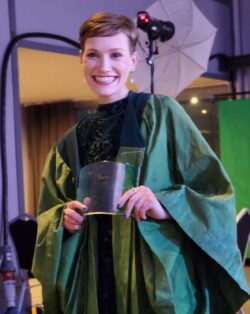
Green Gown Award winner Hazel is a 3rd year PhD researcher in the Institute of Climate and Atmospheric Sciences. Her work involves examining the relationship between trees, climate, and air quality by looking at how large changes in tree cover, associated with afforestation commitments, may impact the concentrations of compounds in the atmosphere, and associated air quality. Outside of her PhD, Hazel gets involved in a range of voluntary activities to encourage young people to engage with and act for woods and tree, including working with the Sustainability Service.
We asked Hazel what inspired her to get involved in climate and atmospheric science:
Enrolling on a PhD investigating trees and how they interact with the atmosphere was wholly motivated by my experience surveying the trees on campus as part of the campus i-Tree Survey. This was a living-lab project delivered by the Sustainability Service and UBoC. In 2018 I had the amazing opportunity in my undergraduate degree to survey trees and calculate their delivery of ecosystem services. Learning more about just how powerful trees are, and how useful calculating these services can be for communicating the benefits of trees motivated me to contribute to research that improves our understanding of trees, including their benefits, disservices, and how they are impacted by climate change. I owe my enthusiasm to Dr Cat Scott who I first heard talking about trees in my second year of undergrad, and who is now my PhD supervisor.
Why is tree research important?
It is incredibly important to understand the benefits that different tree species provide, as well as the potential negatives that they can bring, to inform how we plant and manage trees going forwards. The relationships between trees, people, atmosphere and climate are determined by complicated processes, some of which we know little about. But trees are already playing a huge role globally in commitments to mitigate and adapt to climate change. Building the evidence based to inform where trees are planted, which trees we plant, and how we manage them is important to maximise the survival of trees and their ability to contribute environmental benefits.
What is your advice for women and girls wanting to get involved and follow a similar career route?
Firstly, follow your heart! I have been researching trees in different forms for over 5 years now, and when the work feels really tough, or things aren’t going right, knowing I'm working in something I think is important and exciting is a key motivator to keep going. Also, remember you can take a number of different paths to the goal you hope for. Be mindful of doing what might work best for you, not just what you think you're expected to do.
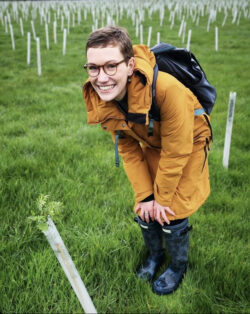
What is the most exciting thing you've done in your career so far?
By far the most exciting thing I have done recently is to be awarded the UK Green Gown Award for Sustainability Champion! It is incredibly rewarding for the work I do to be recognised as important and as making a positive contribution to the community. I really hope to continue working with the Sustainability Service to bring more opportunities for young people to take action for nature on campus.
Claire Quinn - Environmental Social Scientist in the Sustainability Research Institute, School of Earth and Environment
Professor Claire Quinn works in the Sustainability Research Institute, in the School of Earth and Environment. Her background training is as an ecologist, but she is now an Environmental Social Scientist as her interests focus on the interactions between ecological and social systems.
Claire’s current research focuses on African food systems, to understand how environmental change (including climate change) influences farming and food decisions, and how policy can support the transition to more sustainable and resilient food systems.
We asked Claire what inspired her to get involved in environmental social science:
I have always been passionate about the natural world; I grew up watching David Attenborough documentaries! I first worked on the African continent as an ecologist, collaborating with a team of Tanzanian and UK scientists investigating the environmental impacts of the construction of a hydropower dam. Scientists from the University of Dar es Salaam had discovered a new species of toad, that was likely to go extinct due to the development. The newspapers in Tanzania raised the question of whether this new species could and should stand in the way of economic and social progress in the country. It made me realise that you can’t research the natural world in isolation, you have to include people too. Since then, my research has focused on the interactions between the natural world and people, to understand how they impact on each other, and how we can manage natural resources in ways that enable conservation and support people’s livelihoods.
Why is environmental social science important?
Humans are having a huge impact on the natural world, changing land use and over exploiting resources leading to biodiversity declines. This is putting species and ecosystems at risk. It’s important that we find ways to live more sustainably on our planet. My research focuses on agriculture because it is estimated that half of the species at risk are threatened by agriculture, but also the large scale changes we are making to land, water and our climate have consequences for the ability of agriculture to provide the food we need.
What is your advice for women and girls wanting to get involved and follow a similar career route?
My advice would be to find an area or topic that you are passionate about, whether it is in the natural or social sciences, in engineering or computer programming, and think about how you could apply your expertise, knowledge and skills to find and implement solutions to the grand challenges we are facing. Protecting and conserving ecosystems, creating sustainable and resilient food systems, tackling climate change, and so on, needs a range of skills and new ways of thinking and working together.
What is the most exciting thing you've done in your career?
The most exciting thing I’ve done so far has been our FSNet-Africa project, a collaboration between the University of Leeds and the University of Pretoria in South Africa, which has been providing training, mentoring and research support for the next generation of leaders in food systems research on the African continent. It has been hugely exciting to see our FSNet-Africa fellows develop new skills in working across the disciplines and build their international networks, and I’m really looking forward to seeing their careers develop and how their research makes a positive impact on the African food system in the future.
Cat Scott - Environmental Scientist and Lecturer in the School of Earth and Environment
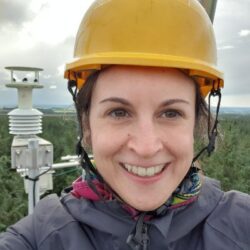
Cat is an environmental scientist and lecturer in the School of Earth and Environment. Her research is about trees and forests and how they interact with the environment around them. Cat’s work spans from using data and computer models to examine these processes, through to practical projects in which new woodlands are being created and landscapes restored!
We asked Cat what inspired her to get involved in environmental social science:
I studied Chemistry for my undergraduate degree and realised that out of all the topics we covered I was most interested in how humans had altered the chemistry of the atmosphere, how this was affecting the planet, and what we were going to do about it.
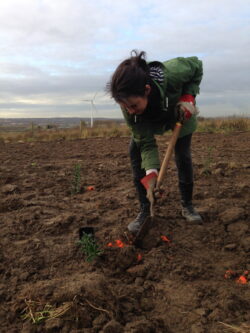
Why is environmental science important?
The climate and biodiversity crises are linked, and they are not going to be solved unless we take substantial and rapid action to both reduce our greenhouse gas emissions and restore ecosystems.
What is your advice for women and girls wanting to get involved and follow a similar career route?
I would say, take opportunities to get experience doing something new or different - sometimes it involves a bit of work to make things happen but often these can be the most valuable experiences.
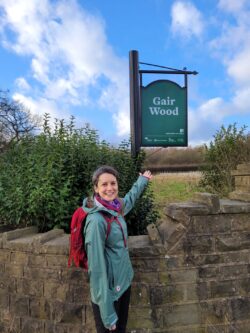
What is the most exciting thing you've done or are going to do?
Last year we planted a new woodland in Leeds (Gair Wood), I'm really excited to see how it grows and for all the research we'll be able to do there over the next few decades!
Are you feeling inspired by these biodiversity champions and wanting to get more involved in sustainability initiatives?
There are a host of opportunities for you to get your foot in the door!
- Check out our Introduction to Sustainability unit on Minerva, which has been developed to ensure all students have an understanding of the importance of sustainability!
- Network and meet like-minded individuals at one of our events.
- We also provide volunteering opportunities.
Keep up to date on the latest news
-
- Follow us on Twitter: @UoL_Sus
- Follow us on Instagram: @uol_sus
- Follow us on Facebook: @UoLSustainability
- Sign up to our Sustainability newsletter
United Nations Sustainable Development Goals
 We use the United Nations Sustainable Development Goals (SDGs) as a framework to guide our activity. Our work on Student Citizenship links to all of the SDGs.
We use the United Nations Sustainable Development Goals (SDGs) as a framework to guide our activity. Our work on Student Citizenship links to all of the SDGs.
Find out more about our impact on the SDGs.

